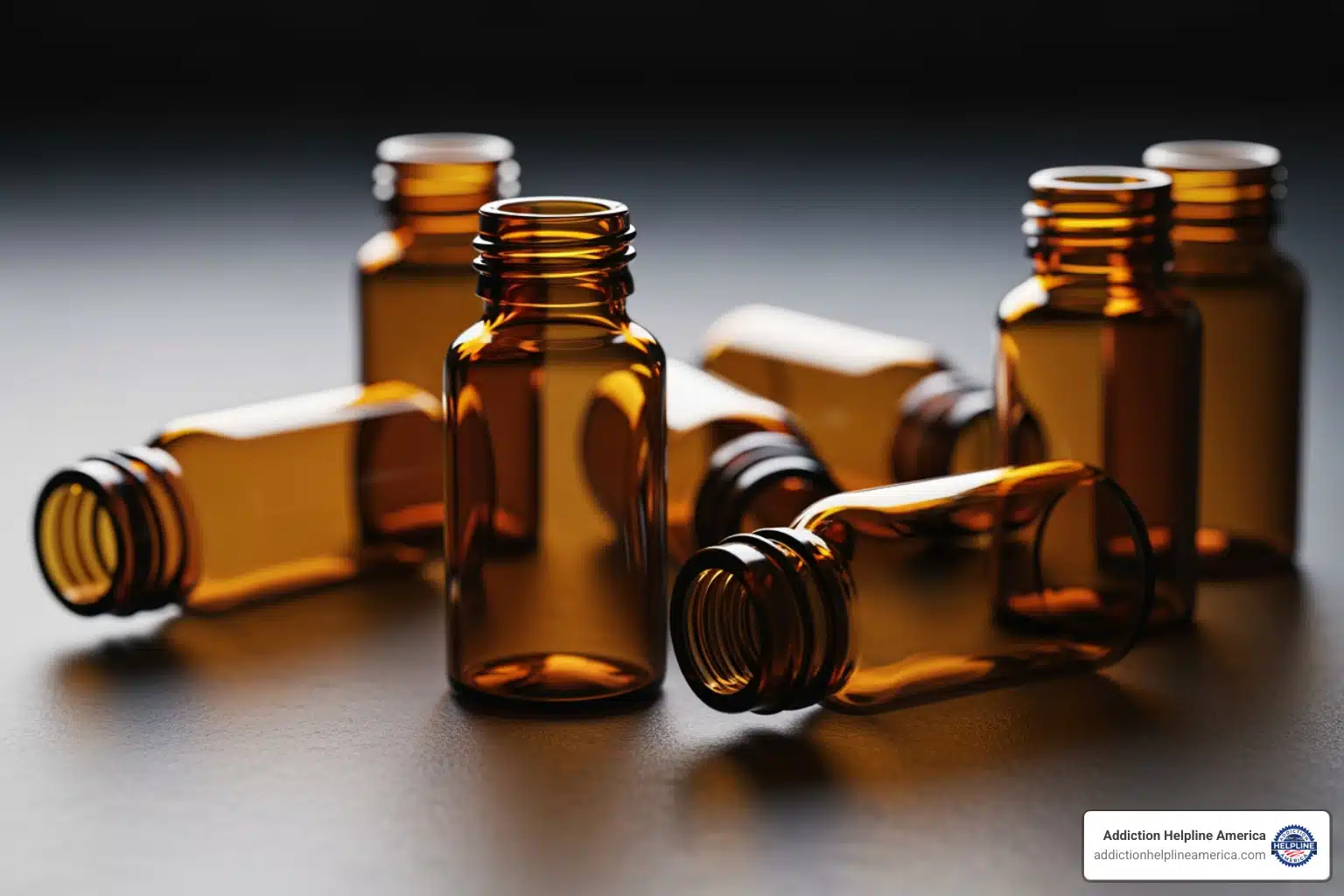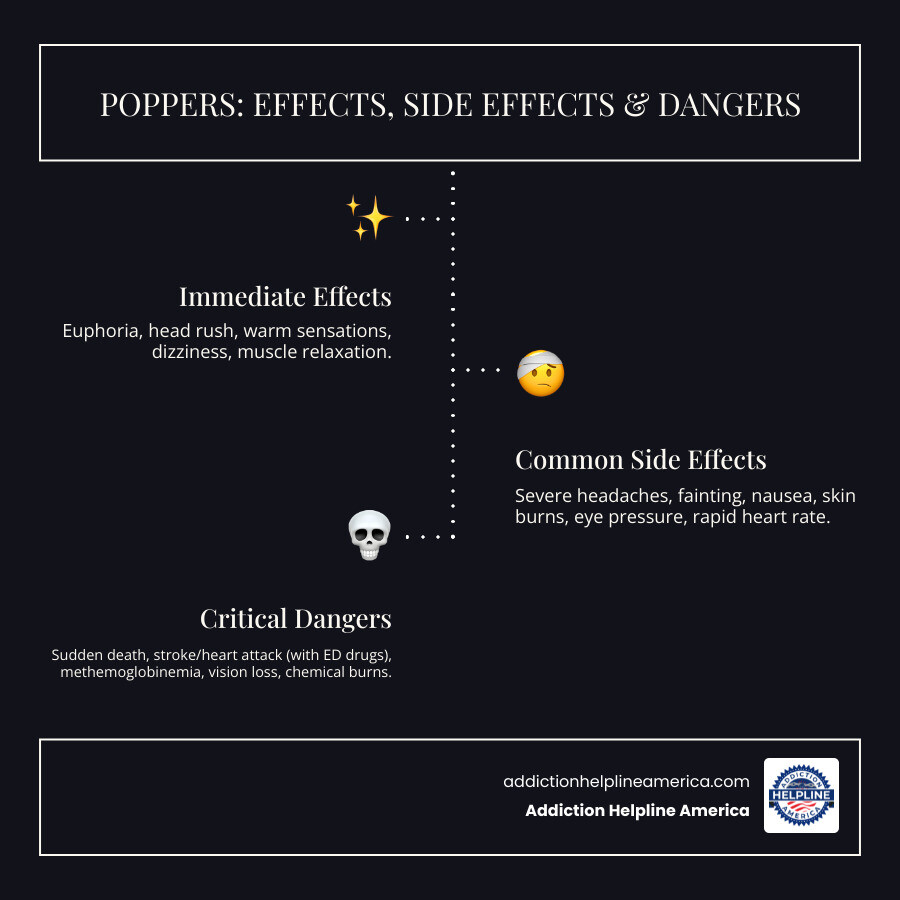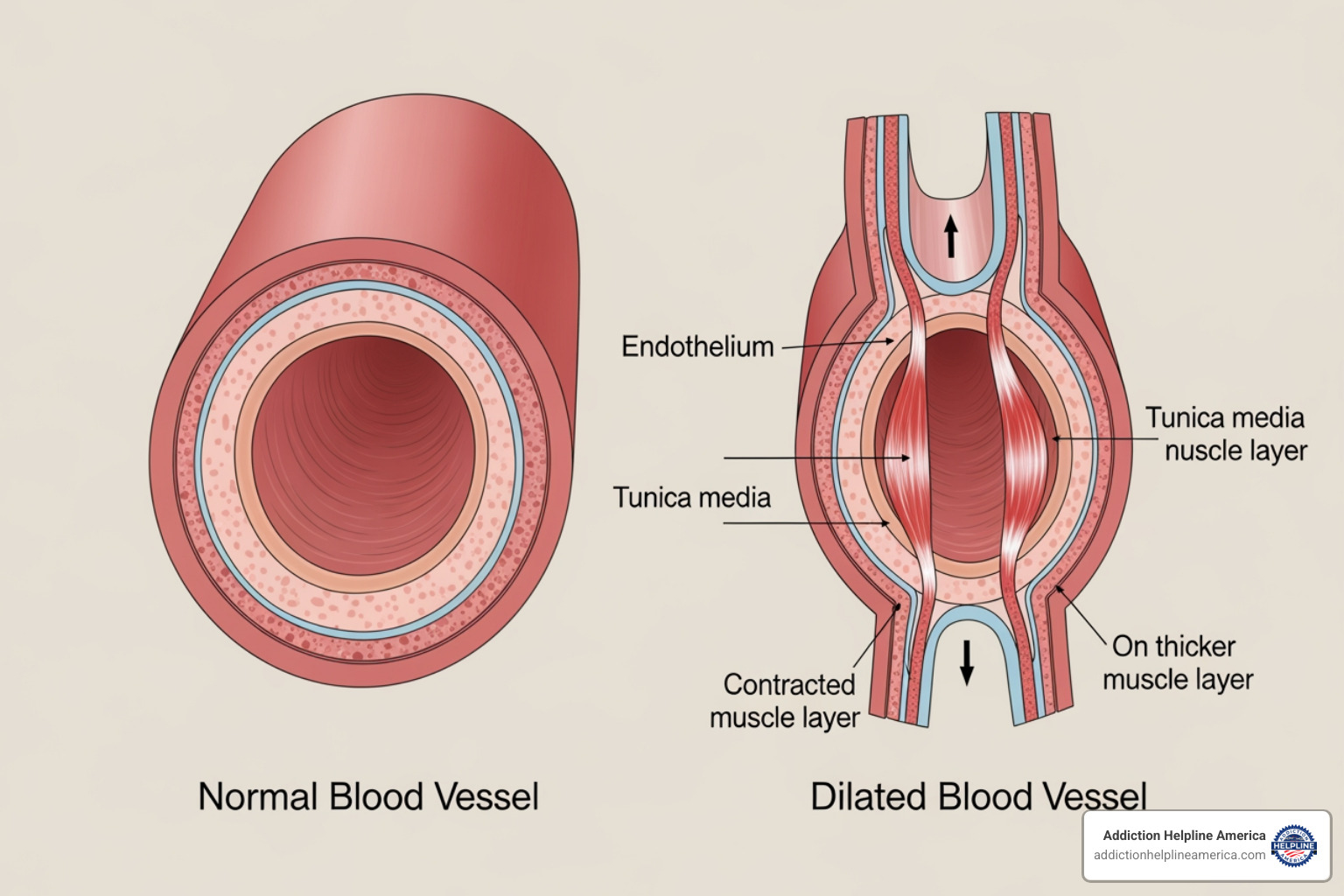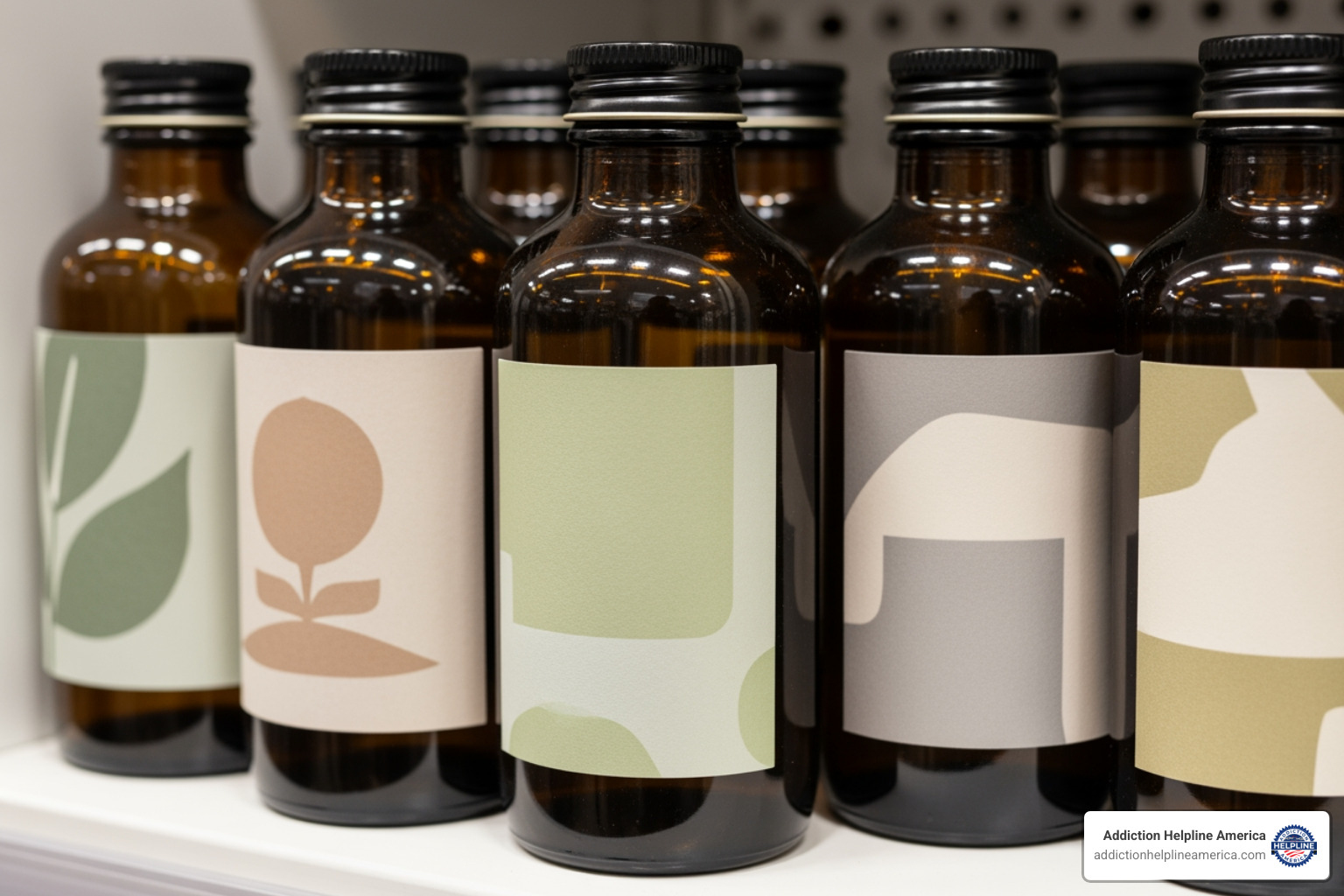
Understanding Poppers: A Dangerous Inhalant
Poppers are recreational inhalants from a class of chemicals called alkyl nitrites. People often ask what they are, how they work, and if they’re safe. The short answer is that they are not safe and carry significant risks.
Quick Facts About Poppers:
- What they are: Liquid chemicals (amyl nitrite, isobutyl nitrite, isopropyl nitrite) sold in small bottles.
- Common names: Rush, Jungle Juice, Locker Room, Liquid Gold, Iron Horse, Sub-Zero.
- How they’re used: Inhaled as vapors through the nose.
- Intended effects: Brief euphoria, head rush, muscle relaxation (lasts 1-5 minutes).
- Critical dangers: Sudden death, stroke, heart attack, vision loss, chemical burns, methemoglobinemia.
- Legal status: Not illegal to possess in the U.S., but illegal to sell for human consumption.
Healthcare providers report increases in deaths and hospitalizations from nitrite products. These substances are often deceptively marketed as “room odorizers” or “leather cleaners” to bypass regulations, but they pose serious health risks.
Poppers are powerful vasodilators, meaning they rapidly widen blood vessels and cause a dangerous drop in blood pressure. This creates the brief “rush” but also puts enormous strain on the heart. They can interact fatally with medications like Viagra or Cialis. Swallowing poppers can cause methemoglobinemia, a life-threatening condition where blood can no longer carry oxygen.
The term “poppers” originated from the sound of crushing glass vials of amyl nitrite, once used medically for angina. Today’s recreational poppers contain various alkyl nitrites never evaluated by the FDA for safety.
At Addiction Helpline America, we provide accurate, compassionate information about substances like poppers to help you make informed decisions for your health or a loved one.

What Are Poppers and How Do They Work?

Poppers are a group of chemicals called alkyl nitrites, most commonly amyl nitrite, isobutyl nitrite, and isopropyl nitrite. They are powerful vasodilators, meaning they cause blood vessels to relax and widen rapidly.
When inhaled, the vapors enter the bloodstream almost instantly, causing the body’s smooth muscles (involuntary muscles in blood vessels, the throat, and anus) to relax. This widening of blood vessels leads to a sudden, significant drop in blood pressure. The heart then beats faster to compensate, creating the intense “rush” users seek—a sensation that comes with serious dangers.
Interestingly, poppers began as a legitimate medicine. Amyl nitrite was first created in 1844, and by 1867, Scottish doctor Thomas Lauder Brunton used it to treat angina pectoris, a painful heart condition. You can read more about Thomas Lauder Brunton’s use for angina pectoris in historical journals. For decades, amyl nitrite was a prescription medication dispensed in glass vials that were crushed to release the vapors, creating a “pop” sound that gave “poppers” their name.
In the 1970s, this controlled medication became a popular recreational drug. This transition to recreational use meant people were using unregulated versions without medical supervision, often unaware of the true contents or risks.
Call Now – Your Journey to Recovery Begins Today!

Take the first step towards a healthier life! Call now to connect with our compassionate team and start your recovery journey today. Your path to healing awaits!
Our recovery specialists are available 24/7 to provide support, and all calls are confidential and free. Reach out anytime – we’re here to help!
Common Names and Forms
Poppers are sold under slang terms like Rush, Jungle Juice, Locker Room, Liquid Gold, Iron Horse, and Sub-Zero. These names make the products sound harmless, which is a deliberate marketing tactic.
Today’s poppers come in small glass bottles. Users unscrew the cap and inhale the vapors directly. While the original medical version came in crushing vials, modern recreational poppers are easier to use and misuse. The name “poppers” has stuck as a catch-all term for any alkyl nitrite product sold for inhaling vapors.
What Are the Intended Effects of Poppers?
People use poppers for the intense but fleeting sensations they produce. The most immediate effect is euphoria—a sudden head rush and wave of warmth. Users may feel lightheaded, which is actually a sign of a dangerous drop in blood pressure.
Many use poppers for heightened sexual pleasure, as they can intensify physical sensations and lower inhibitions. The muscle relaxation effect is also a key reason for their use, as relaxing smooth muscles in the anus and vagina can make penetrative sex feel more comfortable.
However, these effects have an incredibly short duration, lasting only one to five minutes. This brief window often leads users to inhale repeatedly to maintain the feeling, increasing their exposure to the drug’s risks with each use.
The Significant Health Risks of Using Poppers
It’s crucial to be honest about the dangers of poppers. The FDA has issued clear warnings: these products are not evaluated for safe use, and inhaling or ingesting them can cause serious harm or death. Healthcare providers are seeing alarming increases in hospitalizations and deaths linked to these substances, which are often deceptively marketed.
The dangers are immediate and severe, even for first-time users. The rapid drop in blood pressure and racing heart rate create a perfect storm for cardiac emergencies. Sudden sniffing death syndrome can occur after a single use, causing the heart to stop without warning. The risks multiply when poppers are mixed with other substances, especially common medications. Some users also develop dependencies, experiencing drug withdrawal symptoms when they try to stop.
We’re here to ensure you understand what poppers can do to your body, both immediately and long-term.

Immediate Side Effects and Dangers
Inhaling poppers triggers immediate, often unpleasant reactions. The sudden drop in blood pressure can cause intense, pounding headaches, severe dizziness, nausea, and fainting spells. Fainting is particularly dangerous and can lead to catastrophic injuries.
The liquid itself is caustic, causing severe chemical burns on the skin and inside the nose and airways with repeated use. Your heart also takes a beating, racing at over 100 beats per minute (tachycardia), which puts immense stress on the cardiovascular system.
The most terrifying immediate danger is sudden sniffing death syndrome. This isn’t a typical overdose; it’s the heart’s electrical system going haywire from chemical exposure. It can happen to anyone, at any time, even on the first use.
Long-Term Health Consequences and Specific Risks
Repeated use of poppers can lead to severe long-term health problems.
Methemoglobinemia is a life-threatening condition where red blood cells can no longer carry oxygen. It can occur from accidentally swallowing poppers or inhaling large amounts. Without immediate medical treatment, it can cause organ failure and death. Research confirms the risk of methemoglobinemia from ingestion.
Your eyes are also at risk. There are documented reports on poppers maculopathy, a condition causing permanent vision loss, particularly linked to isopropyl nitrite. This can result in blurry central vision that makes reading or recognizing faces difficult.
Using poppers during sex, or “chemsex,” is linked to riskier sexual behaviors and increased rates of HIV and other STIs. The connection between poppers and chemsex and STI risks is well-documented. Regular use may also weaken the immune system, and some alkyl nitrites, like isobutyl nitrite, are classified as possibly carcinogenic.
Dangerous Interactions with Other Substances
Mixing poppers with other substances can be deadly.
Erectile dysfunction medications like sildenafil (Viagra) and tadalafil (Cialis) are the most dangerous combination. Both substances relax blood vessels, and when combined, they can cause a catastrophic drop in blood pressure, leading to stroke, heart attack, or death. People die from this combination regularly.
| Alkyl Nitrite Type | Primary Associated Risks (Recreational Use) |
|---|---|
| Amyl Nitrite | General vasodilation effects, low blood pressure, headaches. Historically used medically. |
| Isobutyl Nitrite | General vasodilation effects, low blood pressure, headaches. Classified as possibly carcinogenic in animal studies. |
| Isopropyl Nitrite | General vasodilation effects, low blood pressure, headaches. Linked to maculopathy and permanent eye damage. |
Alcohol also lowers blood pressure, and combining it with poppers increases dizziness, disorientation, and the risk of fainting or accidents. Any medication that affects blood pressure can interact dangerously with poppers. Stimulants like cocaine or methamphetamine force the heart to work even harder while blood flow is compromised, significantly increasing the risk of heart attack or stroke.
Marketing, Legality, and Regulation
If you’ve seen poppers for sale, you’ve likely noticed they are deceptively labeled as “room odorizers,” “leather cleaners,” “video head cleaners,” or even “nail polish removers.” This is a deliberate marketing strategy to sidestep regulations for products intended for human consumption. This deceptive marketing allows manufacturers to sell a dangerous product without proper oversight, often in packaging that mimics harmless consumer goods.

The legal landscape around poppers in the United States is complicated. While possessing them for personal use is generally not illegal, selling them for human consumption is against federal law. The Anti-Drug Abuse Act of 1988 and subsequent acts banned various nitrites for this purpose.
However, a legal loophole allows these chemicals to be sold for “commercial purposes,” such as legitimate industrial cleaning. Manufacturers exploit this by marketing poppers as household products. The FDA has not evaluated poppers for safe use and strongly advises against their purchase and use. You can read their warning here: FDA advises consumers not to purchase or use nitrite “poppers”. This lack of FDA approval means there is no guarantee of purity or concentration.
Internationally, regulations vary. Canada banned the sale of alkyl nitrites in 2013 due to health risks, and Australia has also restricted their sale. This confusing regulatory environment misleads consumers into believing that a legally sold product must be safe, which is not the case with poppers.
Harm Reduction: Safety Tips and When to Seek Help
We strongly advise against using poppers due to the severe, documented risks. However, we also believe in harm reduction—providing information to prevent tragedy for those who may use them anyway. This approach is about safety, not endorsement.
The link between poppers and sexual activity, especially within the LGBTQ+ community, raises concerns about safer sex practices. Lowered inhibitions can lead to increased STI exposure. For those navigating substance use and identity, our LGBTQ+ Rehab Programs: Complete Guide offers specialized, understanding support. Consent is crucial, and impairment from substances like poppers can affect your ability to give or recognize it.
Call Now – Your Journey to Recovery Begins Today!

Take the first step towards a healthier life! Call now to connect with our compassionate team and start your recovery journey today. Your path to healing awaits!
Our recovery specialists are available 24/7 to provide support, and all calls are confidential and free. Reach out anytime – we’re here to help!
What Are the Safety Tips for Using Poppers?
If you choose to use poppers, these practices can reduce immediate dangers, but no use is completely safe.
- Start with a very small amount to test your body’s reaction.
- Never, ever swallow the liquid. Ingestion can be fatal.
- Avoid all flames (cigarettes, candles) as poppers are highly flammable.
- Never mix poppers with erectile dysfunction drugs (Viagra, Cialis) or alcohol. This combination can be deadly.
- Use only in well-ventilated areas to avoid a buildup of fumes.
- Protect your skin and eyes. Do not press the bottle to your nose. If liquid spills on your skin or gets in your eyes, flush with water immediately and seek medical attention if needed.
- Listen to your body. If you feel a headache, dizziness, or other discomfort, stop immediately.
- Store bottles securely and tightly sealed, away from children and pets.
Signs of a Medical Emergency
Some situations require immediate medical help. Call 911 or go to the nearest emergency room immediately if you or someone else experiences any of these symptoms after using poppers:
- Swallowing the liquid (this is always an emergency).
- Difficulty breathing or gasping for air.
- Blue or gray skin, lips, or fingernails.
- Loss of consciousness or fainting.
- Seizures.
- Chest pain, pressure, or tightness.
Be honest with medical professionals about what was used. They need this information to save a life. If you need support beyond an emergency, our Crisis Addiction Hotlines are available for confidential help.
Frequently Asked Questions about Poppers
Here are answers to some of the most common questions we hear about poppers.
Are poppers addictive?
Poppers do not typically cause physical dependence like opioids or alcohol, so you won’t experience severe physical withdrawal. However, psychological dependence is a very real risk. Users can begin to crave the rush or feel they need poppers for sexual experiences. This can lead to a compulsive pattern of use.
Tolerance can also develop, meaning you need more to get the same effect. This cycle of increasing use is a sign of psychological dependence. Understanding how The Brain Is Affected By Drug Addiction can help you recognize these patterns. If you feel unable to stop using, it’s a sign that dependence has taken hold and it’s time to seek support.
How long do the effects of poppers last?
The effects of poppers are extremely brief. The rush begins within seconds of inhalation but typically lasts only 30 seconds to a few minutes. The main high fades very quickly, though minor effects like lightheadedness may linger for 5 to 10 minutes.
This short duration is why users often re-dose repeatedly, which dramatically increases their exposure to the chemicals and multiplies the health risks.
Can you overdose on poppers?
Yes, you can overdose on poppers, and it can be fatal. An overdose can happen from inhaling a very large amount or, most dangerously, from swallowing the liquid.
Overdose symptoms require immediate emergency medical help. These include methemoglobinemia, a life-threatening condition where your blood can’t carry oxygen, causing blue or gray skin (cyanosis). Other signs are a severe drop in blood pressure (severe hypotension), irregular heart rhythms, seizures, coma, and death.
“Sudden sniffing death syndrome” is a form of overdose where the heart stops, and it can happen even on the first use. If you see signs of an overdose—difficulty breathing, blue skin, loss of consciousness, or seizures—call 911 immediately.
Conclusion
If there is one key takeaway from this guide, it’s that poppers are not harmless. These alkyl nitrites, deceptively sold as “room odorizers” or “leather cleaners,” carry serious, potentially fatal risks for anyone who uses them.
The dangers are immediate and long-term, including severe headaches, chemical burns, and permanent vision loss. Swallowing the liquid can cause life-threatening methemoglobinemia, where your blood stops carrying oxygen. Mixing poppers with medications like Viagra can cause a catastrophic drop in blood pressure, leading to stroke, heart attack, or death. Finally, sudden sniffing death syndrome can cause cardiac arrest without warning, even in first-time users.
At Addiction Helpline America, our mission is to provide honest, compassionate information so you can make safe choices. We understand the complexities of substance use and are here to help without judgment.
Call Now – Your Journey to Recovery Begins Today!

Take the first step towards a healthier life! Call now to connect with our compassionate team and start your recovery journey today. Your path to healing awaits!
Our recovery specialists are available 24/7 to provide support, and all calls are confidential and free. Reach out anytime – we’re here to help!
If you or someone you love is using poppers or struggling with any substance, seeking help is a sign of strength. We offer free, confidential guidance to connect you with the right treatment resources from our nationwide network. We have partners in every state, from Alabama to Wyoming, including Washington D.C., ensuring you can find local support.
Don’t steer this alone. Call us today to Find help for drug use and treatment options and take the first step toward a healthier future. Your health is worth protecting, and we are here to help.
Our helpline is 100%
free & confidential
If you or someone you care about is struggling with drug or alcohol addiction, we can help you explore your recovery options. Don’t face this challenge alone—seek support from us.
Programs
Resources
Will my insurance
cover addiction
treatment?
We're ready to help
Find the best
drug or alcohol treatment
center
Are you or a loved one struggling with addiction? Call today to speak to a treatment expert.















